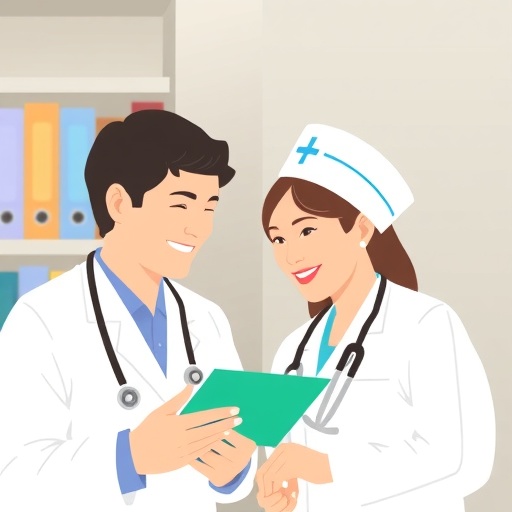In the evolving landscape of medical education, innovative pedagogical approaches are consistently being explored to enhance the learning experiences of nursing students. A recent study conducted by Baran and Özdemir sheds light on the comparative effectiveness of peer education versus traditional education on developing psychomotor skills and self-efficacy within nursing students. This rigorous single-blind randomized controlled trial published in BMC Medical Education seeks to address critical gaps in the methodology used to train future healthcare professionals, ultimately aiming to improve patient care.
The importance of psychomotor skills in nursing practice cannot be overstated. These skills encompass the physical processes required for patient care, including but not limited to, administering injections, wound care, and conducting assessments. Mastery of these skills is crucial since they are often the foundation upon which nursing competencies are built and assessed. Nursing students must not only acquire knowledge but also translate that knowledge into effective physical actions, making the methods employed in teaching these skills paramount.
The study by Baran and Özdemir introduces a fresh perspective by juxtaposing peer education against traditional methods. Traditional education typically involves a more instructor-centered approach, where educators deliver knowledge, often in a lecture format. This was the standard for years, but there is a growing body of evidence suggesting that alternative pedagogies, such as peer education, can foster deeper engagement and retention of the skills necessary for nursing practice. By enabling students to learn from one another, peer education can create a more collaborative learning environment, enhancing both social and academic outcomes.
In this randomized controlled trial, nursing students were divided into two groups: one received traditional instruction while the other was immersed in a peer education framework. The motivation for this bifurcation speaks to the need for empirical evidence on the efficacy of peer education, which has already seen successful applications in various educational fields. Perhaps surprisingly, this method can lead to a situation where students assume positions of authority, solidifying their understanding through teaching and reinforcing their self-efficacy.
The concept of self-efficacy, a term coined by psychologist Albert Bandura, is central to understanding how students perceive their capabilities in executing psychomotor skills. When students feel competent, they are more likely to engage actively in clinical practice settings, contributing to their overall development as healthcare providers. This study meticulously measured the levels of self-efficacy among participants, providing valuable insight into how different teaching methodologies can impact confidence and performance in clinical scenarios.
Through careful statistical analysis, the researchers uncovered compelling data regarding the outcomes of both educational strategies. Key indicators of psychomotor skill acquisition and self-efficacy were evaluated pre- and post-intervention. The results showed a significant positive trend among students in the peer education group, illuminating the advantages of collaborative learning environments in developing critical nursing skills.
What stands out in this research is not just the immediate outcomes but also the long-term implications of these teaching methods in practice. Modern nursing education must align with contemporary healthcare demands, fostering not just technical skills but also abilities such as teamwork and communication essential for holistic patient care. Peer education can simulate real-world scenarios where nurses must collaborate effectively, thereby training students more fully for their impending roles.
Educators and academic institutions must take note of such studies as they consider curricular revisions. While traditional methods remain integral to nursing education, the incorporation of alternative strategies like peer education can provide students with a more rounded skill set. This approach not only addresses the practical competencies required in nursing but also reinforces the importance of peer support and community within the profession.
In line with increasing evidence supporting peer education, it is pertinent for nursing programs to prioritize research-backed methods that resonate with students’ learning preferences. Self-directed learning opportunities should be harnessed, allowing students to cultivate independence and confidence. Given the evolving demands of healthcare, educational strategies must provide nursing students tools for success well beyond their academic tenure.
In the grander narrative of healthcare education, Baran and Özdemir’s findings add a unique voice advocating for innovation that inspires nursing students. The potential ramifications are profound: increased self-efficacy can lead to enhanced patient outcomes in practice, reduced errors, and greater overall satisfaction among both nurses and patients. The implications extend beyond academia, fostering a workforce that is not only skilled but also resilient and adaptable to changing healthcare landscapes.
As these discussions gain momentum, stakeholders—academics, policymakers, and healthcare organizations—must engage collaboratively to redefine the paradigms of nursing education. By prioritizing peer education and other innovative methods, the nursing profession can advance significantly, ensuring that tomorrow’s healthcare providers are equipped with the skills, confidence, and collaborative spirit essential for optimal patient care.
Ultimately, it is the responsibility of the healthcare education community to address these pedagogical shifts with vigor, crafting learning environments that reflect the complexities of modern practice. Research such as that conducted by Baran and Özdemir lays the groundwork for ongoing dialogues about the best ways to educate future nurses, contributing substantially to the discourse on healthcare quality and professionalism, now and for generations to come.
In conclusion, the evidence emerging from this single-blind randomized controlled trial emphasizes the transformative potential of peer education in nursing programs. As the medical field continues to adapt and evolve, embracing such innovative educational strategies may well be the key to training effective, competent, and confident healthcare practitioners who can meet the challenges of the future head-on.
Subject of Research: The effectiveness of peer education versus traditional education on psychomotor skills and self-efficacy in nursing students.
Article Title: Peer education versus traditional education on psychomotor skills and self–efficacy in nursing students: a single–blind randomized controlled trial.
Article References:
Baran, L., Özdemir, H. Peer education versus traditional education on psychomotor skills and self–efficacy in nursing students: a single–blind randomized controlled trial.
BMC Med Educ 25, 1371 (2025). https://doi.org/10.1186/s12909-025-08038-1
Image Credits: AI Generated
DOI:
Keywords: nursing education, peer education, traditional education, psychomotor skills, self-efficacy, randomized controlled trial.




